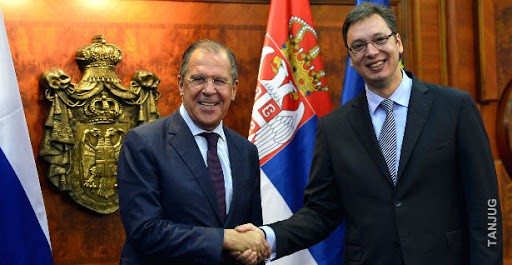
Serbian President Aleksandar Vučić said that Russian Foreign Minister Sergey Lavrov informed him during Thursday’s meeting about the worrying information concerning various Western plans and ideas regarding a solution to the Kosovo crisis.
Vučić pointed out that he exchanged opinions with Lavrov on a number of issues but that the key topic was the relationship between the two countries and Russia's support for the integrity of Serbia and the situation in Kosovo.
“We received certain assessments from the Russian Federation […] which worried me. They concern various plans and ideas regarding the solution to the Kosovo crisis. I do not want to deceive anyone and hide from the public: obviously we are facing a difficult period, in which we will face great pressure to realise some plans that we did not officially or unofficially get, but based on the assessments of our Russian friends, it seems that we will have to be very careful in following every idea that is presented to us,” Vučić said at the press conference after their meeting.
Thanking Russia for supporting Serbia in the United Nations and in all international forums, Vučić said that it had been agreed that Serbia would consult with Russia almost on a daily basis, emphasising that one thing was clear: “If at any time and in any place a solution is reached, any solution requires the consent of Russia. We do not want everyone else to be consulted without anyone asking Russia anything.”
He added that Russia supported the dialogue under the auspices of the EU, while Serbia is ready to listen to all other political actors and their ideas. He emphasised that Serbia will be able to protect its vital national interests, regardless of the price it will have to pay.
The meeting between Vučić and Lavrov comes as Richard Grenell, the U.S. President's special envoy for Kosovo, last week said that discussions and negotiations between Serbia and Kosovo will take place at the White House in Washington on June 27. Although U.S. President Donald Trump is swamped with domestic issues like the coronavirus pandemic and the Black Lives Matter movement, he still wants to reach a solution on Kosovo to register another foreign policy achievement, even if foreign policy is currently secondary in the lead up to the elections.
Every effort to resolve the Kosovo issue has so far ended with Serbian unilateral concessions. Belgrade should not have illusions that the White House can do something quickly for its benefit without concessions, especially if in the future Serbia cannot get counter-concessions. To avoid this, Russia’s support is critical. Serbia does not need to resolve the Kosovo issue too quickly, unlike the illegal Albanian administration in Pristina that is losing international recognition and has major economic problems, especially as more than a quarter of the population is unemployed.
Lavrov's visit would be a great relief to Belgrade because the President of Serbia received concrete information from the Russian Minister about how much and what kind of pressure there will be to create a final solution of the Kosovo issue in the near future. By receiving this warning directly from Russia in official form and getting Moscow’s assurances that they will continue to support Serbia, demonstrates that the U.S. cannot dictate actions in Kosovo as easily as they would have hoped. Kosovo is still a European issue on which security and stability in Europe depends.
Lavrov reiterated in Belgrade that Russia maintains that the issue of Kosovo cannot be resolved without the United Nations and the Security Council, and that the solution must be based on international law and United Nations Security Council Resolution 1244 that clearly stipulates that Kosovo is in an autonomous region, not an independent state as it illegally self-declared in 2008.
By having Russia’s full backing, this allows the Serbian diplomatic contingency to go to Washington on Saturday with confidence despite any pressures that the U.S. and the Albanians might put against them. For this reason, Vučić will not agree to an independent Kosovo as many have speculated.
